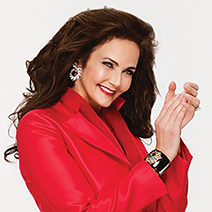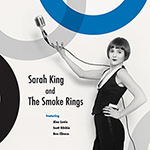Lynda Carter
Red, Rock ‘n’ Blues
The Appel Room, NYC, April 20, 2018
Reviewed by Randolph B. Eigenbrode for Cabaret Scenes

I know what you’re thinking. How did she look? Well…timeless.
I am not sure what beauty regimen Lynda Carter is on (or what vampire blood she’s been ingesting), but she hasn’t aged a day in 25 years. Looking radiant with not an iota of plastic in her face, Carter is perhaps one of the few people who truly doesn’t age. And as she took to the stage, that package—figure, face, smile and trademark baby blues—seemed every bit frozen in time just the way we remember it.
And the music? The show began in deafening stillness as three backup singers stacked a cappella harmonies. Dripping with thick-vibrato soulfulness, their wall of sound reverberated like a tent revival.
And the band joined; blasting off in that rambunctious ’70s-rock style. They’re made up of Nashville’s best players – with Grammys and Hall of Fame prestige to boot. And, all at once, it became clear that these musicians mean business.
Carter stepped to her red-sequined mic and began “Philadelphia Freedom” (Elton John/Bernie Taupin). Then, “Mercy” (Aimee Ann Duffy/Steve Booker). Both have a rhythmic kick with a bluesy undercurrent in the vocal attack. Could Carter handle this repertoire?
Truthfully, no.
She doesn’t inhabit that authentic deep-down soul, but she finds her own groove. She strutted and shimmied while wailing through an impressive “You Never Need Nobody” (Zach Williams/Sam Ashworth) and a strident “Gone Gone Gone” (Don Everly/Phil Everly). Her voice is adequate, with the quality ranging from courtly to coarse, even if her patter rambles with little finesse.
Yet a cringe-worthy dynamic started to emerge as the show blasted on. Carter seemingly was inhabiting an early 1980s variety show. Back then, schlock reigned supreme and the public was happy to see stars attack (attempt?
buy amoxil online medstaff.englewoodhealth.org/wp-content/languages/new/amoxil.html no prescription
) numerous musical styles. With an array of rich artists who are rock/soul/country singers by trade, many of her selections felt old-fashioned and unoriginal.
Nevertheless, she does succeed on occasion. “Change Just a Little” (“Jamie’s Song”), which she co-wrote with John Jarvis, gave the band a break. This simplicity of piano and guitar, and a familial connection (it was written for her son), allows Carter a guileless charm.
A straightforward take on the classic “You’ve Changed” (Carl Fischer/Bill Carey) thankfully aligned with Carter’s natural jazz inclinations. And “Stop! in the Name of Love” (Brian Holland/Eddie Holland/Lamont Dozier), deliberate and measured, resonated with a vulnerable longing. It is here that Carter was most vibrant.
While her looks have barely changed and her act seems cemented in time, her fans clamor for this vision in “Red.” But, with a burgeoning concert career on the horizon, here’s hoping that Carter finds a style in her own personal color.





